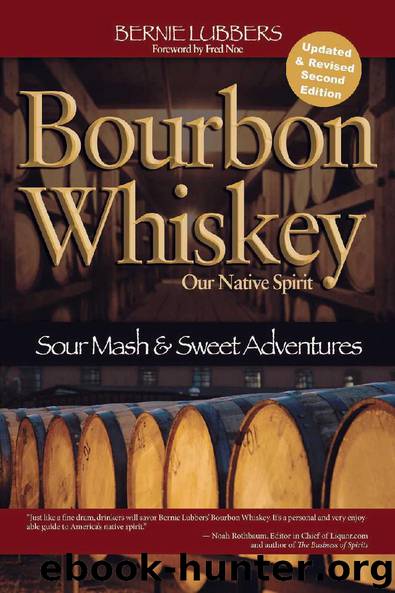Bourbon Whiskey by Bernie Lubbers

Author:Bernie Lubbers [Lubbers, Bernie]
Language: eng
Format: epub
Tags: Beverages/Non-fiction
ISBN: 9781935628255
Publisher: Cardinal Publishers Group
Published: 2012-10-15T05:00:00+00:00
Many people think that Prohibition is a thing of the past. But let’s not forget it is still alive and well. Thirteen million people live in Prohibition today in dry counties all over the South and other states. In Kentucky we have 120 counties, and 79 of them are dry! The joke in Kentucky is that Bourbon County is dry, but Christian county is wet. I believe Bourbon County is “moist” now. You can order beer, wine or a drink but only at a restaurant.
Prohibitionists like Russell, Wheeler and Nation thought the country would be a better, more moral, and safer place to live. But nothing could have been further from the truth. It not only kept hundreds of millions of dollars out of the federal coffers, contributing to the Great Depression, but it allowed a level of corruption, violence and mafia rule that almost destroyed the country. Franklin Roosevelt realized that this act needed to be overturned to get the country back on the right path, and more importantly to create jobs in distilleries, liquor stores and saloons, and thus start more tax money flowing back in to Washington.
When Prohibition was repealed, it was a joyous day indeed – but it would be awhile before there would be good product for the devoted bourbon drinkers. Before Prohibition there were 75 distilleries; afterward, only 51 applied for licenses. And, of course, for a bourbon to be a bourbon, it has to be aged for four years or more, so the distilleries didn’t have a marketable product until the late 1930s.
As soon as he could, Colonel Jim Beam applied for a license to open a distillery in 1934. He almost had to, because he was going broke. Like other distillers, he simply got into other lines of work when Prohibition started. Colonel Beam got into citrus farming in Florida and the rock quarry business as well. Back in the 1920s it was hard to travel to Florida to oversee the operation, so he continued to live in Kentucky and lost quite a bit of money in that venture. He did OK in the rock quarry business, but not well enough. It seemed that bad luck followed him around during Prohibition. It was said that if Colonel Beam started a funeral home, people would suddenly just stop dying.
Other distillers filed for “medicinal licenses” and sold the bourbon they had in stock through druggists by prescription only. Brown-Forman did that and sold Old Forester. As a matter of fact, Old Forester is the only bourbon that was sold before, during, and after Prohibition by the same company. Old Grand Dad was also sold by the Wathen Distillery, and Stizel and Weller with Pappy Van Winkle sold medicinal whiskey. But this was a very limited market, and the bourbon could only be sold medicinally, and only with stocks on hand before Prohibition.
A few years later, WWII broke out and distilleries were mandated in 1942 by F.D.R to make ethanol for gun powder, vehicle fuel and rubber for tires.
Download
This site does not store any files on its server. We only index and link to content provided by other sites. Please contact the content providers to delete copyright contents if any and email us, we'll remove relevant links or contents immediately.
| Buying Guides | Cellars |
| Champagne | Collecting |
| Spirits | Whiskey |
| Wine | Wine Pairing |
| Wine Tasting |
Whiskies (Collins Gem) by dominic roskrow(42214)
101 Whiskies to Try Before You Die by Ian Buxton(42182)
Whiskies Galore by Ian Buxton(40332)
Craft Beer for the Homebrewer by Michael Agnew(17446)
Right Here, Right Now by Georgia Beers(3497)
Not a Diet Book by James Smith(2726)
Water by Ian Miller(2584)
The Coffee Dictionary by Maxwell Colonna-Dashwood(2531)
Kitchen confidential by Anthony Bourdain(2306)
Coffee for One by KJ Fallon(2008)
Smuggler's Cove: Exotic Cocktails, Rum, and the Cult of Tiki by Martin Cate & Rebecca Cate(1979)
Beer is proof God loves us by Charles W. Bamforth(1920)
Superfood Smoothie Bowls: Delicious, Satisfying, Protein-Packed Blends that Boost Energy and Burn Fat by Chace Daniella(1903)
Talking as Fast as I Can by Lauren Graham(1832)
Bourbon: A Savor the South Cookbook by Kathleen Purvis(1791)
A Short History of Drunkenness by Forsyth Mark(1720)
Eat With Intention by Cassandra Bodzak(1688)
Cocktails for the Holidays by Editors of Imbibe magazine(1626)
Colombia Travel Guide by Lonely Planet(1609)
